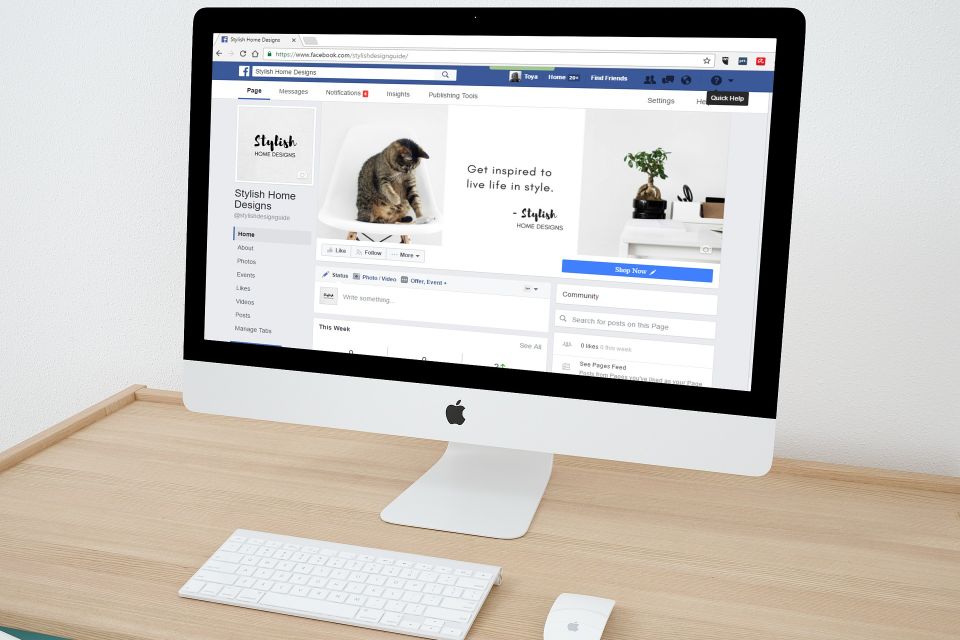Why a Facebook Page is Not a Substitute for a Website
When establishing your small business's online presence, it's crucial to ensure it exudes professionalism and strength. While many turn to social media platforms like Facebook for this purpose, relying solely on a Facebook page as your primary or sole online representation can prove to be a grave mistake. In this piece, we'll delve into the top ten reasons why utilizing a Facebook page as your business website is an ill-advised choice, along with exploring alternative strategies for enhancing your online visibility.
Lack of Ownership: A significant drawback of utilizing a Facebook page as your business website is that you relinquish ownership control. As Facebook owns the page, they retain the authority to alter, remove, or diminish its visibility in search results at any given time. This lack of autonomy can pose challenges and potential harm to your business, particularly if you've invested considerable effort in building your Facebook presence.
Exclusion of Non-Facebook Users: While Facebook boasts a user base exceeding two billion, there remains a segment of the population, particularly within younger and older demographics, who do not utilize the platform. Relying solely on a Facebook page for your online presence runs the risk of alienating these potential customers. Considering the diverse range of channels through which individuals seek information, it's imperative to explore all avenues for reaching your target audience.
Limited SEO Opportunities: While it's feasible to optimize a Facebook page to a certain extent, the scope for targeting keywords and posting content is restricted. Additionally, a Facebook page's presence in search results is limited to one instance, unlike a website with multiple pages, which can appear multiple times. This disparity can impede potential customers' ability to discover your business online.
Paid Reach: Despite the ostensibly free nature of creating and posting content on Facebook, the organic reach of these posts is often restricted. To broaden their visibility to a larger audience, businesses may need to invest in paid advertisements. While this expenditure may not be significant for some enterprises, it's essential to incorporate it into your marketing budget.
Limited Functionality: While a Facebook page allows for posting updates, uploading photos, and engaging with customers via Messenger, its functionality pales in comparison to that of a website. Websites offer the flexibility to incorporate forms, e-commerce capabilities, and customized pages and posts with diverse formatting options.
Absence of a Sales Funnel: A website facilitates the creation of a sales funnel—a series of steps guiding potential customers toward making a purchase. Utilizing calls-to-action, landing pages, and other strategies, websites navigate users through the sales process. Conversely, Facebook pages lack the same degree of control, thus impeding the ability to steer users toward conversions.
Limited Content Opportunities: While Facebook pages accommodate an "About Us" section and updates, they lack a platform for publishing in-depth content that captivates users and enhances search engine rankings. Websites offer the flexibility to create and share blog posts, articles, and other content types conducive to attracting and retaining customers.
Branding Constraints: Facebook pages permit customization to a limited extent, primarily through cover images and profile pictures. Conversely, websites afford greater autonomy, allowing businesses to select color schemes, fonts, and design elements conducive to creating a cohesive and professional brand image.
Content Organization: Websites facilitate the organization, storage, and searchability of pages and posts, allowing easy access and reference to archived content. Conversely, Facebook page content organization options are constrained, with no provision for exporting content. This limitation complicates content retrieval for both businesses and customers.
Inadequate Analytics: While Facebook pages provide rudimentary insights into post reach and engagement, their analytics fall short of the depth and customization afforded by website analytics. This disparity hinders businesses' ability to gauge the effectiveness of their marketing efforts and make informed, data-driven decisions.
In essence, a Facebook business page should complement—not substitute—a website. To elevate your business's online presence, it's imperative to invest in a professional website. Websites enable brand promotion, comprehensive product or service showcasing, sales funnel creation, and detailed marketing analytics tracking. Although utilizing a Facebook page may seem convenient and cost-effective initially, its inherent limitations render it an unsuitable long-term choice.
That's where our web design firm steps in! Specializing in crafting affordable, professional websites for businesses of all sizes, our experienced team of designers and developers collaborates with you to create a website that embodies your brand essence and aligns with your business objectives. Furthermore, once your website is operational, your Facebook page can serve as a promotional tool, driving traffic to your site.
Don't confine your online presence—invest in a professional website and propel your business to new heights. Reach out to us today to explore how we can empower your business's online success.


